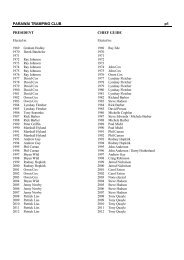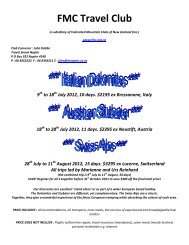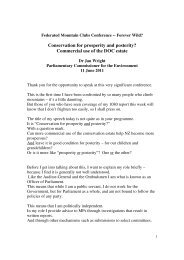August 2012 Issue - Federated Mountain Clubs of NZ
August 2012 Issue - Federated Mountain Clubs of NZ
August 2012 Issue - Federated Mountain Clubs of NZ
Create successful ePaper yourself
Turn your PDF publications into a flip-book with our unique Google optimized e-Paper software.
Science on Ice, Discovering theSecrets <strong>of</strong> AntarcticaBy Veronika Meduna,Auckland University Press,<strong>2012</strong>. Hardcover, 226pages, $59.99. Reviewedby Shaun Barnett (NewZealand Alpine Club).Science writerand broadcasterVeronika Medunawill be well familiarto any Radio NewZealand listenerswho enjoy herprogramme Our Changing World. In this, herlatest book, she explores the fascinating world<strong>of</strong> Antarctic science. Meduna mostly focuseson modern New Zealand scientists workingin the New Zealand sector <strong>of</strong> the frozencontinent, since the establishment <strong>of</strong> ScottBase in 1957–58, but also celebrates the work<strong>of</strong> overseas researchers, and where relevant,includes reference to science carried out duringthe Heroic Age <strong>of</strong> exploration under men likeScott and Shackleton.Five broad themes divide the book. Thefirst, ‘Uncovering the Past’, covers ice coreresearch that has helped explain not only theicy continent’s past, but also past climaticconditions in the wider world. ‘Life’ not onlycovers research into the famous Antarcticpenguin species (Adelie and Emperor) butalso Antarctic fish, lichens, mosses and microorganisms.I learnt that the muscles used byEmperor penguins to operate their legs arelocated deep within their warm core, ensuringthat they can move their extremities even in theKonini LodgeDawson Falls - Egmont National ParkPowered Backpacker style accommodationContact: North Egmont Visitor CentrePhone: (06) 756 0990Email: egmontvc@doc.govt.nzwww.doc.govt.nzmost frigid conditions. And as you’d expect froman experienced journalist, Meduna writes withverve. Adelie penguins, she says, inhabit a noisypenguin metropolis. ‘The colonies are always inmotion. Even when birds are incubating eggs,they rarely sit completely still or stop calling, skypointingtheir beaks and trumpeting a throatystring <strong>of</strong> shrieks.’Even more fascinating are the adaptationsmade by fish species to avoid freezing, includingdoing away with haemoglobin. The chapters‘True Antarcticans’ and ‘Oasis in a FrozenDesert’ were a revelation to me, dispelling mythsthat most <strong>of</strong> the frozen continent is lifeless. Quitethe contrary, microbiologists are discovering ahuge diversity <strong>of</strong> bacteria and other minusculeorganisms that inhabit all sorts <strong>of</strong> extremeenvironments, ranging from the hot volcanicvents <strong>of</strong> Mt Erebus to the bottom <strong>of</strong> the frozenlakes, and even the glaciers <strong>of</strong> the interior. Some<strong>of</strong> these organisms survive by spending longperiods dormant or freeze-dried, and prove thatlife persists even in the most hostile conditions.Antarctic lichens, Meduna writes ‘are ecologicalendurance athletes’ – organisms that grow asslowly as one millimetre per century. Some havebeen found living only 400 kilometres from theSouth Pole. The final chapter, ‘Beyond the Ice’details mind-boggling research into the verynature <strong>of</strong> the universe which occurs right at theSouth Pole.Excellent photographs, superblyreproduced, form another strength <strong>of</strong> thebook, many <strong>of</strong> them taken by helicopterpilot Rob McPhail. Meduna writes with allthe confident fluidity <strong>of</strong> someone who knowsscience, but even more importantly, someonewho knows how to communicate science. Sherenders quite complex facts and concepts intoaccessible prose, and also manages to celebratethe work <strong>of</strong> individual scientists. She explainsthe difficulties <strong>of</strong> doing science in the windiest,driest, coldest continent, but equally conveys thedeep appreciation that most <strong>of</strong> these scientistsfeel for the place.An absorbing read, Science on Ice shouldappeal to a wide audience.56FMC Bulletin • <strong>August</strong> <strong>2012</strong>






